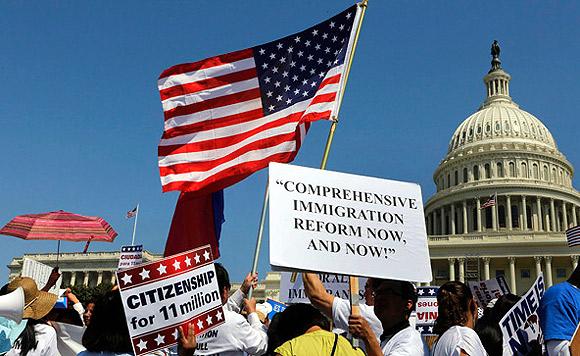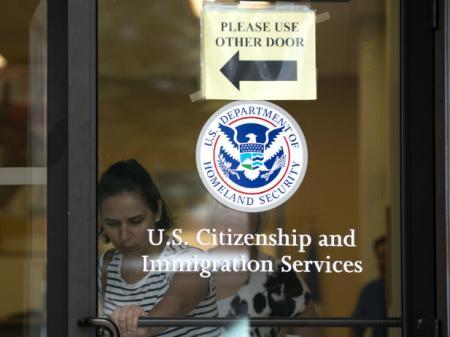 | « Back to article | Print this article |
How the immigration Bill will hit Indian companies
Trade and economic engagement between India and the US has always been on a high growth path, and provides a focus to both nations' bilateral strategic partnership.
And leading the charge is the Indian information technology (IT) industry, which plays a significant role in shaping India's high growth trajectory, creating value for clients and helping them create employment, thus emerging as a major driver for the US economy.
Both countries have worked closely to develop a zygotic relationship that has proved mutually beneficial.
A new Bill tabled by a bipartisan group of eight Senators, however, has many conditions that can adversely impact the Indian IT industry and create a roadblock to the future of this relationship.
The recently tabled US comprehensive immigration Bill appears detrimental to business, and will make it difficult for companies to continue adding value to customers.
There are definitely some welcome recommendations in the Bill, such as an increase in the H1-B cap, enhancing the availability of visas for skilled professionals, reducing the processing time for green cards and the introduction of start-up visas.
The author is President, Nasscom.
How the US immigration Bill will hit Indian companies
The H-4 spousal employment and premium processing are additional positive changes that are being introduced through the Bill.
Unfortunately, however, the issue of skilled workers travelling for short durations is being linked to the larger debate on immigration and does not take into account the contribution of the Indian IT industry to the US economy.
As you read through the detailed sections of the tabled Bill that deal with labour mobility conditions on highly skilled people, one would question whether the intent is to ease access to skilled talent or create bigoted policies, particularly against the Indian IT industry and its business model.
The Bill categorises companies by percentage of their US workforce and imposes conditions of higher visa fees and higher salaries.
There are concerns such as restrictions in wage requirements, lack of access to visas, increase in visa fees, enhanced audits and enforcements and non-displacement guarantees.
These provisions are discriminatory because they are likely to be applicable to only select companies, and not all technology companies that provide similar services.
Click NEXT to read more...
How the US immigration Bill will hit Indian companies
The condition related to work visa holders being unable to work at client sites is particularly draconian since onsite services are an important component for any key project.
It is almost like saying, "You can hire an architect to design your house, but he/she cannot work at the house location."
The Senate immigration Bill, which is currently pending in the United States Congress, would make it unviable for Indian firms to bring temporary workers on H-1B visas for project execution, while giving US companies access to a larger pool of those visas to bring over their own foreign workers.
All these restrictions in the Bill are the result of the high level of misperception that exists among US policy makers about the Indian technology sector.
Their perceptions undermine the contribution the Indian industry in making US corporations competitive and helping them transform.
The model followed by Indian companies is no different from US companies. US services companies also have large delivery centres in India and, as part of delivering projects, use temporary visas to send skilled people from India for onsite execution.
Click NEXT to read more...
How the US immigration Bill will hit Indian companies
While the proposed restrictions impact the Indian industry, one also needs to assess the impact of these changes on US companies, their competitiveness and access to global markets.
Most of these companies have intertwined business models that leverage talent, domain and expertise across markets, very often in partnership with the Indian technology industry.
These companies are a key player in the Indian domestic market for technology and other sectors. It is also interesting to note that the IT sector's unemployment rate in the US is now below the traditional rate for "full employment", according to the recent data released by the US Labour Department.
A recently released report by the National Foundation for American Policy (NFAP) has stated that between financial years 2006 and 2011, the top 25 India-based companies utilised between six and 15 per cent of the new H-1B visa approved for initial employment, and about 20 per cent in financial year 2012.
In 2012, the 26,865 new H-1B visas approved for the top 25 India-based companies equalled only 0.017 per cent of the US labour force.
Click NEXT to read more...
How the US immigration Bill will hit Indian companies
In fact, NFAP Executive Director Stuart Anderson has stated that "research indicates measures to restrict the use of H-1B visas are not based on sound evidence and would represent a serious policy mistake that would shift more work and resources outside the US".
The Bill has been tabled in the Senate and will go through discussions and debate, during which other Senators would offer alternative suggestions.
While those who have introduced restrictive clauses may have been influenced by vested interests, there are others who are balanced and moderate and understand that discriminating provisions never work.
As an economy, the US will need to recognise the contributions of Indian IT companies, with reference to business growth and employment creation.
It is imperative that the US Senate delink the issues of illegal immigration and unemployment with limited-period work visas and view this issue without tinted glasses.
In the words of American politician Bob Finer, "As Congress continues to debate ways to address illegal immigration; we must remember the many hard-working legal immigrants that contribute so much to our nation's economy and culture."





